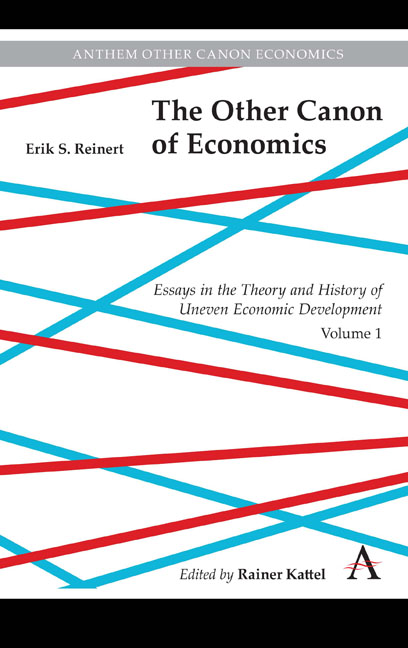Book contents
- Frontmatter
- Dedication
- Contents
- Introduction
- Chapter 1 Catching-up from Way Behind. A Third World Perspective on First World History
- Chapter 2 Recent Trends in Economic Theory — Implications for Development Geography
- Chapter 3 A Schumpeterian Theory of Underdevelopment - A Contradiction in Terms?
- Chapter 4 Competitiveness and Its Predecessors - A 500-Year Cross-national Perspective
- Chapter 5 Diminishing Returns and Economic Sustainability: The Dilemma of Resource-based Economies under a Free Trade Regime
- Chapter 6 Economics: ‘The Dismal Science’ or ‘The Never-ending Frontier of Knowledge’? On Technology, Energy and Economic Welfare
- Chapter 7 Production Capitalism vs. Financial Capitalism – Symbiosis and Parasitism. An Evolutionary Perspective and Bibliography
- Chapter 8 Globalization in the Periphery as a Morgenthau Plan: The Underdevelopment of Mongolia in the 1990s
- Chapter 9 Increasing Poverty in a Globalized World: Marshall Plans and Morgenthau Plans as Mechanisms of Polarization of World Incomes
- Chapter 10 An Early National Innovation System: The Case of Antonio Serra’s 1613 Breve Trattato
- Chapter 11 Innovation Systems of the Past: Modern Nation-States in a Historical Perspective. The Role of Innovations and of Systemic Effects in Economic Thought and Policy
- Chapter 12 The Other Canon: The History of Renaissance Economics
- Chapter 13 Benchmarking Success: The Dutch Republic (1500–1750) as Seen by Contemporary European Economists
- Chapter 14 Mercantilism and Economic Development: Schumpeterian Dynamics, Institution Building and International Benchmarking
- Chapter 15 Development and Social Goals: Balancing Aid and Development to Prevent ‘Welfare Colonialism’
Chapter 3 - A Schumpeterian Theory of Underdevelopment - A Contradiction in Terms?
Published online by Cambridge University Press: 13 April 2024
- Frontmatter
- Dedication
- Contents
- Introduction
- Chapter 1 Catching-up from Way Behind. A Third World Perspective on First World History
- Chapter 2 Recent Trends in Economic Theory — Implications for Development Geography
- Chapter 3 A Schumpeterian Theory of Underdevelopment - A Contradiction in Terms?
- Chapter 4 Competitiveness and Its Predecessors - A 500-Year Cross-national Perspective
- Chapter 5 Diminishing Returns and Economic Sustainability: The Dilemma of Resource-based Economies under a Free Trade Regime
- Chapter 6 Economics: ‘The Dismal Science’ or ‘The Never-ending Frontier of Knowledge’? On Technology, Energy and Economic Welfare
- Chapter 7 Production Capitalism vs. Financial Capitalism – Symbiosis and Parasitism. An Evolutionary Perspective and Bibliography
- Chapter 8 Globalization in the Periphery as a Morgenthau Plan: The Underdevelopment of Mongolia in the 1990s
- Chapter 9 Increasing Poverty in a Globalized World: Marshall Plans and Morgenthau Plans as Mechanisms of Polarization of World Incomes
- Chapter 10 An Early National Innovation System: The Case of Antonio Serra’s 1613 Breve Trattato
- Chapter 11 Innovation Systems of the Past: Modern Nation-States in a Historical Perspective. The Role of Innovations and of Systemic Effects in Economic Thought and Policy
- Chapter 12 The Other Canon: The History of Renaissance Economics
- Chapter 13 Benchmarking Success: The Dutch Republic (1500–1750) as Seen by Contemporary European Economists
- Chapter 14 Mercantilism and Economic Development: Schumpeterian Dynamics, Institution Building and International Benchmarking
- Chapter 15 Development and Social Goals: Balancing Aid and Development to Prevent ‘Welfare Colonialism’
Summary
The aim of this chapter is to show that the dynamics of Schumpeterian economics, in addition to explain the creation of wealth, also implicitly contain the elements of a theory of relative poverty. It is argued that the German tradition of economics, of which Schumpeter is a part, has always encompassed the necessary elements of a theory of uneven growth. List, Marx, and Schumpeter have all emphasized different aspects of this uneven growth. This contrasts sharply with the Anglo-Saxon tradition which, particularly since the 1890s, has produced theories of growth and trade which imply an even, converging distribution of world activity and income.
The organization of the chapter is as follows: Section 1 contrasts Anglo-Saxon and German economic traditions from the point of view of theories of uneven growth vs. theories of even growth. Section 2 raises the question of the relationship between technical change and underdevelopment, and identifies two key mechanisms which create uneven distribution of the gains from technical change. The two are (I) the consequences of the extremely uneven advance of the ‘technological frontier’ and (II) Classical and Collusive spreads of technological gains. Section 3 shows how these mechanisms work to create three cases of ‘Schumpeterian underdevelopment’ in the Caribbean. In Section 4 it is claimed that the factors identified in Section 2 may create conflicting interests between the two parts that every individual plays in economic life, that of producer and that of consumer. It is claimed that these are identical only under the assumptions of neo-classical economics and in special cases of what is labelled symmetrical trade. Finally, in Section 5, the policy conclusions of these findings are discussed. It is showed how the conflicting interests of man-the-consumer and man-the-producer, produced by classical and collusive spreads of technical change, were central to the creation of US industrial policy in the early nineteenth century.
Anglo-Saxon vs. German economics: Theories of even vs. theories of uneven growth
Friedrich List, Karl Marx and Joseph Alois Schumpeter are the German economists who have had a major influence on economic policy outside the German-speaking area. The theories of Marx and Schumpeter are deeply rooted in the traditions of the German Historical School of Economics, and although Friedrich List antedates what is generally seen as the starting point of the older historical school, his approach is clearly that of a ‘proto-historical school’.
- Type
- Chapter
- Information
- The Other Canon of EconomicsEssays in the Theory and History of Uneven Economic Development, pp. 63 - 88Publisher: Anthem PressPrint publication year: 2024

